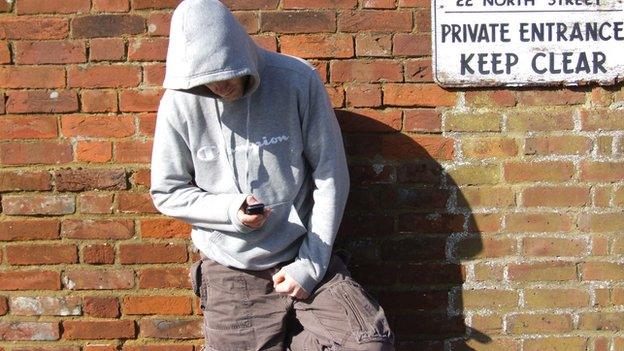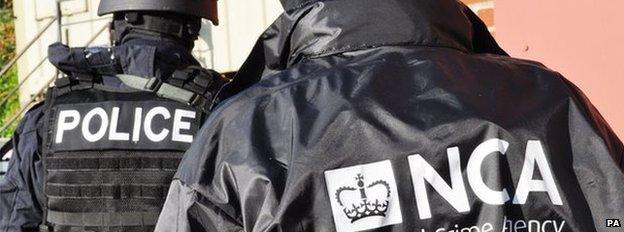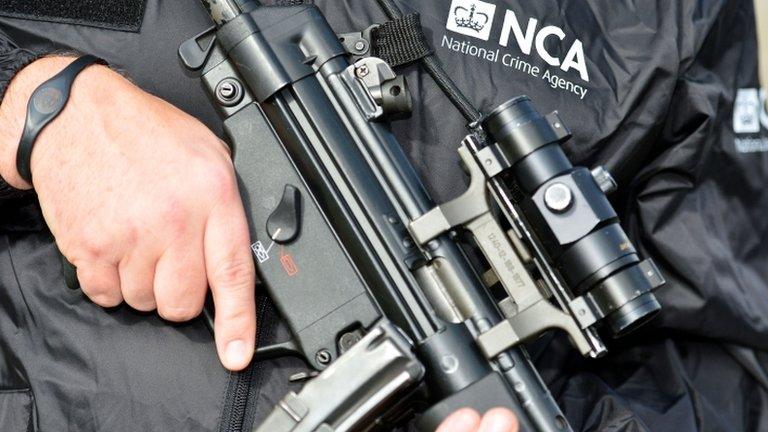Drug gangs 'extending out of cities', report warns
- Published

City-based organised crime gangs are taking over drug networks in coastal and market towns by using telephone hotlines, a report says.
The National Crime Agency - the UK body charged with fighting organised crime - also said gangs were trying to recruit vulnerable people, often children, to act as couriers and to sell drugs.
Its report said gangs used a single telephone number for orders.
The use of so-called "county lines" is an emerging issue, the government said.
According to the NCA report, there is "growing" evidence of gangs - particularly from London and the South East - using mobile phone lines to extend drug dealing into new areas.
Hotlines are marketed using "business cards", while gang members exchange drugs for the phone numbers of known drug users, sending out blanket text messages.
Others gangs offer introductory offers and buy-one-get-one-free deals to attract new business, the NCA said.
The issue now affects the majority of UK police forces, it said.

What are 'county lines'?

The NCA says gangs from big cities introduce a telephone number in a new area to sell crack and heroin directly at street level.
Phone lines represent a gang's "brand" rather than an individual, do not change frequently, and are usually run from the their "home" city, it says.
Drug users from the new area ring the number and local runners are then dispatched to make deliveries via a telephone "relay or exchange system", the report says.
They are increasingly exploiting children - often boys aged 14-17 - to act as runners and to conduct the day-to-day dealing.
Phone numbers can be used for a number of years, or even decades, and can be sold for up to £25,000.
One police expert estimated that one line was earning £3,000 a day - or £21,000 a week - for a gang.

'Hostile takeovers'
The report said more than 50% of towns targeted by gangs were next to or near to the coast, while about 15% were commuter towns near London.
It said seven police forces had identified 827 people and 181 groups as being involved in "county lines" drug dealing.
Drug operations were run like businesses, with urban gangs carrying out hostile takeovers of existing distribution networks in new markets.
Drug users, or young women gang members enter into relationships with, are often exploited to provide locations for drugs to be stored in new areas.
Violence can also be used to "secure an operating base, coerce people into becoming runners and top enforce drugs debts", it said.
Many drug lines have links with gangs in London, it added.
However, BBC Home affairs editor Mark Easton said a recent drugs operation revealed how arrests in the Thames Valley area were linked to a drug network in Cheltenham.
Police have called for an expansion into rural counties to combat the problem, he added.


Mark Easton, BBC home editor
As organised crime syndicates expand their operations into more rural and coastal towns, it is a sign of the times that the police response is as much about safeguarding as it is criminality.
Today's report starts from a concern that "vulnerable young people are being exploited in order to facilitate the running of street level drug dealing".
Not so long ago such individuals would have been seen as criminals, whatever their age. Now they are seen as victims.
The change in emphasis follows a series of court cases revealing how young people were being sexually exploited in a number of English towns by gangs.
There is concern the authorities did not do enough to protect children, in part because they were also known to be offenders.
The Home Office, responding to the report, reflects the new focus on child protection.
The dividing line between offender and victim has become blurred, a recognition of how organised criminals groom and exploit individuals to act as couriers and dealers.

'Emerging national issue'
Ms Bradley, Home Office minister responsible for preventing abuse and exploitation, said the government was working with 43 local areas facing problems with gangs and youth violence.
"This work includes supporting a network of over 80 experts with frontline experience of dealing with gangs and drug dealing linked to organised crime and funding to support women and girls who suffer harm, including sexual violence, at the hands of gang members.
"We also recently updated the statutory definition of a gang to reflect changes in the way that gangs operate.
"County lines is an emerging national issue, which involves the exploitation of vulnerable young people and adults by violent gang members in order to move and sell drugs across the country."
- Published7 October 2013
